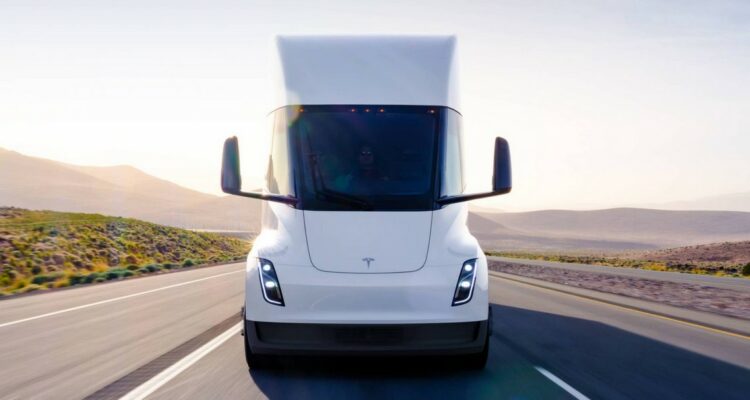
The first Tesla Semi trucks were delivered to customers on Thursday during a ceremony at the company’s Gigafactory in Sparks, Nevada, five years after their initial unveiling.
The trucks’ 2019 production launch was postponed for a number of reasons, including the COVID-19 pandemic and a global components scarcity. The trucks were first revealed in concept form back in 2017. PepsiCo representatives were present to accept the initial shipment of trucks; the company had reserved 100 Semis shortly after its announcement.
According to Tesla, the Semi has a battery range of up to 500 miles, four independent motors on the rear axles, and can accelerate from 0 to 60 mph in 20 seconds. Prices may start at $150,000, and there have been many low-dozen orders from companies like Walmart and FedEx.
Musk discussed the need to lessen the amount of carbon emissions generated by the transportation of goods around the world while seated on a stage surrounded by four Tesla Semis, two of which were wrapped in Pepsi and Frito Lay logos. But after giving the cause of battling climate change lip service, he quickly shifted to his own brand of showmanship.
Elon Musk, CEO of Tesla, exclaimed on stage during the occasion, “It looks sick. “You should operate that. That gadget, in particular, appears to be futuristic. Later, Musk called the Semi “a beast.”
Musk listed a variety of characteristics he claimed will make the Semi the most effective, appealing, and maneuverable truck on the road. The truck will have a new 1,000-volt powertrain architecture that, according to Musk, will be taken into account during the development of future Tesla products. The Semi has an automatic clutch for smooth highway driving, regenerative braking to increase battery efficiency, and traction control to prevent jackknifing.
In many ways, technology has advanced, according to Musk.
Musk stated over the weekend that one of Tesla’s battery-powered class 8 semi-trucks has driven 500 miles while carrying 81,000 pounds of freight. The journey was made from San Diego at the southernmost tip of the state to Tesla’s facility in Fremont, California. Musk emphasized at the occasion that the journey was completed without the battery needing to be recharged.
The Semi is being promoted by Tesla as the truck of the future. However, while the company has had difficulty launching production, EVs have already been accepted by the rest of the transportation industry. Major machinery producers including Daimler, Volvo, Peterbilt, and BYD have been developing their own electric long-haul vehicles. According to Bloomberg, the three Tesla Semis that were delivered today were the last component of a $30.8 million project that was financed in part by the California Air Resource Board. Even Nikola Motors, which has battled accusations of fraud and executive turnover, delivered a truck powered by hydrogen before Tesla.